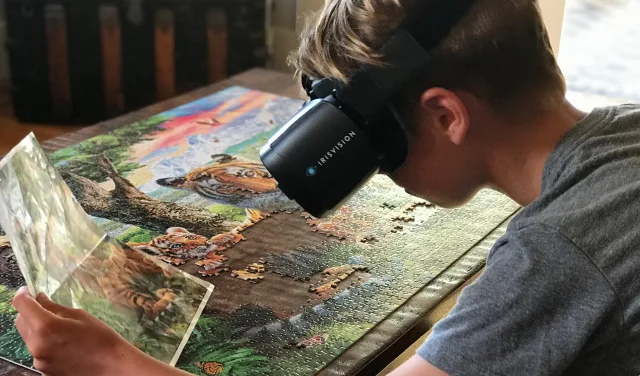Are you or your loved one fighting some form of visual impairment? Tired of using conventional assistive technologies available in the market? Time to switch to IrisVision – a revolutionary assistive technology created by industry veterans and vision scientists.
Start Your 30 day risk-free trial today. Terms and conditions apply
Thousands of low vision and vision impaired individuals across the global have experienced the change.
IrisVision received the Fast Company Honoree Award at the company’s major annual awards. The World Changing Ideas program focuses on honoring companies seeking to elevate products and brave concepts that make the world better.

Watch a live sports games on TV
Capture and save photos of your most treasured memories
Revisit the habit of reading with ease using optical character recognition (OCR)
Your very own personal assistant with smart voice commands feature
Our team helps you get started and make the most out of the wearable low vision solution, available for you round-the-clock.
Our esteemed panel of expert coaches help you better understand and easily adapt to the IrisVision headset through 1-on-1 coaching sessions done remotely.


IrisVision features rely on cellular or WiFi connectivity. Enjoy up to 500MB of data usage until your device has been set up on your Wi-Fi network within 60 days from shipment. For those without access to Wi-Fi, IrisVision offers an extended Data Usage Plan.
Fill and submit the form
Receive free consultation to assess and monitor the feasibility of lrisVision by one of our specialists
Upon meeting the eligibility criteria you can avail a 30 free trial
Our expert coaches will then provide 1-on-1 free training for you to make the most of lrisVision
In case if the lrisVision experience is not for you, the device can be returned
Fill and submit the form
Receive free consultation to assess and monitor the feasibility of lrisVision by one of our specialists
Upon meeting the eligibility criteria you can avail a 30 free trial
Our expert coaches will then provide 1-on-1 free training for you to make the most of lrisVision
In case if the lrisVision experience is not for you, the device can be returned

“IrisVision makes me feel independent. It helps me with my school work now and will help me in the future when I have a career as a psychologist or published author.”
Assistive technology can be defined as technology created and designed for people with disabilities to facilitate them in performing functions such as accessing information technology (IT).
Though there are various types of assistive technologies, the few common types are:
Assistive technology devices for the visually impaired are specifically designed to help counter or overcome visual challenges caused by an eye injury or disease. These electronic devices use technology to amplify or improve an individual’s functioning and independence.
The World Health Organization reports that globally, more than 1 billion people need 1 or more assistive products. The application of these assistive technology devices is unique based on the specific features and functionalities of the devices. Each disability requires different assistive technologies. They are modified according to the specific needs or problems faced by the user such as difficulty speaking, seeing, writing, remembering, hearing, walking, etc.